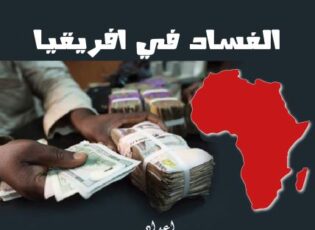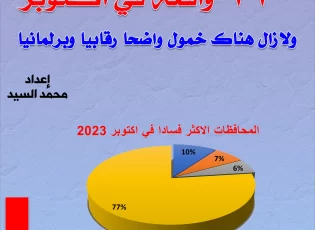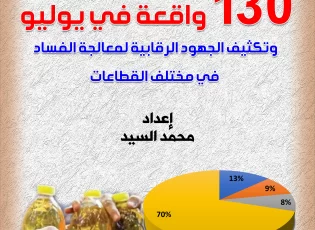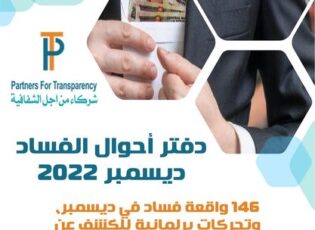A decrease of 20% in corruption rates during March amid extensive efforts to control markets
Partners for Transparency: Parliamentary performance declined in March and the intensity of supervisory work on markets during the month of Ramadan
Within the framework of the “Corruption Casebook” series, the “Partners for Transparency” Foundation continues to issue monthly reports to monitor and follow up on corruption incidents in Egypt, which focus on monitoring and analyzing legislative and procedural developments related to combating corruption, as well as listing the incidents that were revealed during the month of March 2024. , and classify them sectorally and geographically, with the aim of identifying the sectors that witness the most corruption incidents, as well as the governorates in which these incidents are most concentrated.

March recorded a significant decrease in the number of corruption incidents, as 95 incidents were recorded, compared to the 119 corruption incidents recorded last February, which represents a decrease of 20 % in the rate of corruption, and the catering sector topped the list in the number of incidents during March, as 47 corruption incidents were recorded. With a percentage of 49% of the total incidents witnessed in the month of March, it was closely followed by the agriculture and land encroachments sector, with 26 incidents and a percentage of 27% of the total incidents under study. The health sector came in third place with 16 incidents of corruption and a percentage of 17TP3T of the total incidents of corruption.
Geographically, Beheira Governorate ranked first among the Egyptian governorates in terms of corruption incidents during the month of March, by recording 9 incidents and a percentage of 9 % of the total incidents, while 3 governorates combined recorded a percentage of 22 of the total incidents of corruption at the republic level, making them the governorates The most corrupt governorates during March are Beheira, Gharbia, and Dakahlia.
 In this context, the “Partners for Transparency” Foundation praises the campaigns to control markets during the month of Ramadan in order to control prices and prevent merchant manipulation. However, these efforts were not sufficient in light of the weak performance of the House of Representatives during the past month. There is a need to integrate efforts aimed at combating corruption. At all supervisory, executive and legislative levels.
In this context, the “Partners for Transparency” Foundation praises the campaigns to control markets during the month of Ramadan in order to control prices and prevent merchant manipulation. However, these efforts were not sufficient in light of the weak performance of the House of Representatives during the past month. There is a need to integrate efforts aimed at combating corruption. At all supervisory, executive and legislative levels.










